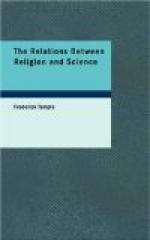It will be seen at once by those who have followed me that I am in this Lecture only working out to its logical conclusion what was said long ago by Bishop Butler in England and by Kant in Germany. Butler calls the spiritual faculty whose commands to us I have been examining by the name of conscience: Kant calls it the practical reason. But both alike insist on the ultimate basis of morality being found in the voice within the soul and not in the phenomena observed by the senses. Science by searching cannot find out God. To reduce all the phenomena of the universe to order will not, even if it could ever be completely done, tell us the highest truth that we can attain to concerning spiritual things.
Science may examine all the phases through which religions have passed and treating human beliefs as it treats all other phenomena it can give us a history of religion or of religions. But there is something underlying them all which it cannot treat, and which perpetually evades all attempts to bring it under physical laws. For just as all attempts to explain away our conviction of our own personal identity have invariably failed and will for ever fail to satisfy human consciousness, so too the strictly spiritual element in all religion cannot be got out of phenomena at all. No analysis succeeds in obliterating the fundamental distinction between moral and physical law; or in enabling us to escape the ever increasing sense of the dignity of the former, or in shutting our ears to the still small voice which is totally unlike every other voice within or without. To bring the Moral Law under the dominion of Science and to treat the belief in it as nothing more than one of the phenomena of human nature, it is necessary to treat the sentiment of reverence which it excites, the remorse which follows on disobedience to its commands, the sense of its supremacy, as delusions. It is always possible so to treat these things; but only at the cost of standing lower in the scale of being.
But we have one step further to take. For as the spiritual faculty is the recipient directly or indirectly of that original revelation which God has made of Himself to His rational creatures, so too this appears to be the only faculty which can take cognizance of any fresh revelation that it might please Him to make. If He commands still further duties than those commanded by the supreme Moral Law, if He bids us believe what our reason cannot deduce from the primal belief in that Law and in Himself, it is to that faculty that the command is issued. If over and above the original religion as we may call it there is a revealed religion, it is the spiritual faculty that can alone accept it. Such a revelation may be confirmed by signs or proofs in the world of phenomena. He who is absolute over all nature may compel nature to bear witness to His teaching. The spiritual may burst through the natural on occasion, and that supremacy, which underlies all nature and which is necessarily visible to intelligences that are capable of seeing things as they are in themselves, may force itself into the world of phenomena and show itself in that manner to us. But this always is and must be secondary. The spiritual faculty alone can receive and judge of spiritual truth, and if that faculty be not reached a truly religious belief is not yet attained.




